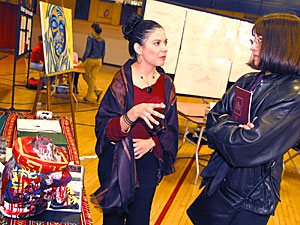 |
|
EVAN CARAVELLI/Arizona Daily Wildcat
|
Marisol Badilla, an art and Spanish literature junior, discusses her photography and the effects of neo-liberalism in Mexico her artwork, yesterday during the Undergraduate Research Forum.
|
|
|
By Jessica Lee
Arizona Daily Wildcat
Thursday, February 12, 2004
Print this
Standing next to a colorful display of artwork inspired by a summer in Chiapas, Mexico, Marisol Badilla turned pages in her photo album that depicted the effects of neo-liberalism in the town of San Cristobal de las Casas.
"Here is a wealthy couple, with lighter skin, eating at a Domino's," Badilla said, as she pointed to the black-and-white photos. "And here are the indigenous children eating the leftovers."
Badilla, an art and Spanish literature junior, was one of 32 students selected by the Honors College last year to conduct an undergraduate research project. The students presented the results of their research yesterday at the 17th Annual Undergraduate Research Forum in Bear Down Gym.
"I got experience doing lab work and learned a lot about sound waves," said Heather Watson, a German studies junior. Watson investigated the possibility of detecting defects in underground pipes by studying the changes in ultrasonic sound waves. When the Kinder Morgan gasoline pipeline broke in Tucson last summer, Watson's research became locally relevant.
"This will hopefully be a more efficient way to test pipelines, which will prevent breakages," Watson said.
To do her project, environmental hydrology and water resources junior Erin Gleeson wanted to get out of the lab. Her research on a herbivorous land crab flew her to Costa Rica. By boat and by foot, she traveled to the Corcovado National Park to study the effects the crabs had on soil quality.
"They are the tropical earthworms," Gleeson said about the crabs that gather leaf litter off the rainforest floor and bury it one meter below. She discovered that in the areas where leaf litter was removed, the soil temperature drop was statistically significant.
While some of the students came across problems in their research, Jessica Dooley's project was the only one to crash, literally.
"I was doing research trying to get a small helicopter to fly by itself by a computer on board," Dooley said, as she pointed at the three-foot long helicopters on display. "We did crash some. We tested first on a computer program, which cut down on the amount of repair jobs."
The applicability of pilot-less helicopters extends from border patrol, and search and rescue to crop-dusting.
Over 60 students competed for research funding last year. The program is open to all undergraduate students, not just Honors College students.
Interested students need to fill out the formal undergraduate research grant application available through the Honors College.
Before applying, students need to develop a research proposal equipped with a hypothesis, background summary, methodology details, a timeline and an explanation of the project's significance.
"Research is the process of creating some sort of new knowledge," said Lucia Barton, program coordinator for the Honors College at a Wednesday informational session.
A committee, put together by the college, evaluates the applications from a set of specific criteria and selects students to receive a research grant.
"They look to see a clear research plan set out. They want to make sure the project is do-able over the summer. It should have some far reaching benefit not only for the student, but for community," Barton said.
Grants are awarded from funds given to the college by Richard Powell, the vice president for research. Last year, the committee awarded $40,000 worth of research dollars.
Students interested in applying for research dollars for 2004 - 2005 will see an increase in the grant due to inflation. Last years students could receive up to $1,000 for their project. This year, the ceiling is $1,500.
Barton stressed that students with no previous research experience should not be deterred from applying.
"I think the projects get better every year, and there is a greater diversity of research. Every year we are really amazed by what the students have accomplished," Barton said.
The deadline for research applications is March 3 at 4 p.m.
Students with questions can stop by the Honors College, Slonaker House, Room 106, or call 621-6901.
